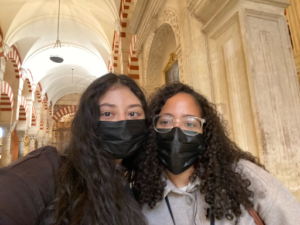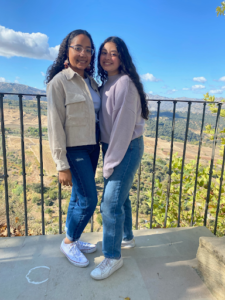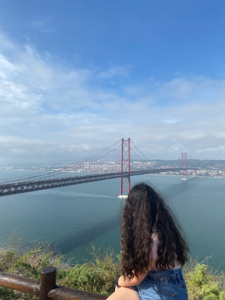Patrick wrote this blog post as an open letter to Prof. Ginny Ryan (Montserrat) upon her retirement from Holy Cross in Spring ’22. Patrick was in Prof. Ryan’s CBL Montserrat course in 2019-2020. The CBL Office thanks Prof. Ryan for all that she has done for CBL!
Dear Professor Ryan,
As I sat down to compose this letter in the seasonally overheated stacks of Dinand Library, I had a lot of trouble with finding a proper way to start this letter. Well, I think the proper way to start this letter would be to congratulate you on your retirement at the end of the academic year! It must be an exciting time for you and your loved ones, and I bet you cannot wait for extra family time. To give this letter some context, each intern in the CBL internship program is required to write a blog post during each academic year. Upon hearing about your retirement, I knew I wanted my post to reflect on my impactful time in your class during my first year at Holy Cross.
During the summer prior to my arrival to the Hill, I was notified that I would be enrolled in your Montserrat for the 2020 academic year. “Exploring Difference?” “Did I actually put this class as one of my top choices?” Was one of my initial thoughts as I read through the email from the College. Initially, I didn’t think the class would be the right fit for me. Nonetheless, I showed up to the first class with the mindset that at least my religious studies requirement would be fulfilled by completing the class. Upon my arrival to class on the first day, I sat in the back right corner of the classroom, hoping to avoid awkward small talk with my fellow classmates as I did in high school. Eventually, all of the seats in the classroom were filled, as we all nervously awaited your instruction. As you introduced yourself, and the expectations of the class, I learned that this class was affiliated with the CBL program. “CBL?” “What does that mean for me?” I thought to myself, as the class reviewed the syllabus. When I learned that the program was based on community service, I was hesitant about how service would align with my busy schedule. However, because my parents had served in the Jesuit Volunteer Corps after their graduation from the college in 1984, I knew I should keep an open mind about the opportunity to experience something different. Additionally, your enthusiasm when it came to the selection process, and close relationships with Prof. Jenkins and the existing CBL interns certainly enhanced the overall experience for myself.
In the weeks that followed my decision to volunteer at the Ascentria Care Alliance, I would be challenged both spiritually and intellectually as your carefully prepared lessons tied in my volunteer experience with the class material. The inclusion of materials like Far From The Tree and The Confessions of St. Augustine, changed my perspective on the world around me and helped me process the various unfamiliar situations that I encountered during my weekly trip to the Ascentria Care Alliance. The service aspect of the course also had a positive impact on the classroom environment. Because you encouraged openness within class discussions, I felt that my classmates were able to bond over shared experiences that were especially notable from prior service experiences throughout the semester. Quickly, the nervously quiet classroom environment became a community unlike any other at Holy Cross. As your infectious compassion influenced conversation between me and my classmates, we began to have compelling conversations about race and privilege within contemporary society. These discussions helped my classmates and myself gain the confidence to speak on topics that many previously considered to be too uncomfortable to discuss with others. By helping me find comfort in discomfort, you taught me how kindness and open mindedness can be used to bring familiarity to unfamiliar situations.
Though the academic year was quite meaningful, my most vivid memory from the class came the day after the College announced that they would be sending students home for the remainder of the 2020 academic year due to the onset of the COVID pandemic. The morning after the announcement, everyone in the class promptly showed up as usual. Clearly, many students in the class were distraught about the announcement. Instead of proceeding with class as usual, you opened up the floor to us to ask questions about what was going on. At the end of our question asking session, you said that we were all free to leave class early because it didn’t make sense to cover any class material during such a turbulent time. Instead of getting up and moving towards the door, every student in the classroom remained seated. Silently, we all sat next to each other and found comfort in each other’s presence. At this moment, I recognized the community that had formed within the classroom. It was clear that none of us knew what was going to happen in the coming days, but that was okay because we could all rely on each other for support. It certainly takes a special instructor who values the holistic development of students, to create an environment like the one that had developed during my freshman year.
Within the weeks that followed our evacuation from campus in the spring of 2020, I was thankfully accepted into the CBL internship program. As a student who arrived on campus without prior knowledge of CBL, it is safe to say that your instruction had a significant impact on my decision to apply for this program. Throughout the course of the year during my freshman year, you gave the class an opportunity to engage in reflection with interns from the CBL internship program. During these reflections, I became aware of my compassion for social justice, and learned the importance of reflection. As a result of these discussions and your encouragement, I gained the confidence to share about my own experiences within the larger class group. By sharing my experiences with my classmates within a large group, I quickly became comfortable with leading conversations, which is a skill that I rely on as a student leader within the Holy Cross community.
It’s safe to say that my story is not unique. In fact, there are many other interns that share similar experiences to mine. Year in and year out, a significant amount of students apply for the CBL internship program from your class. This is obviously not a coincidence. As a result of your willingness to challenge students intellectually and spiritually, your students develop into responsible citizens that positively influence their community. I would like to especially thank you for challenging myself, and changing the trajectory of my college experience. Enjoy retirement!
Sincerely,
Patrick McQuillen




